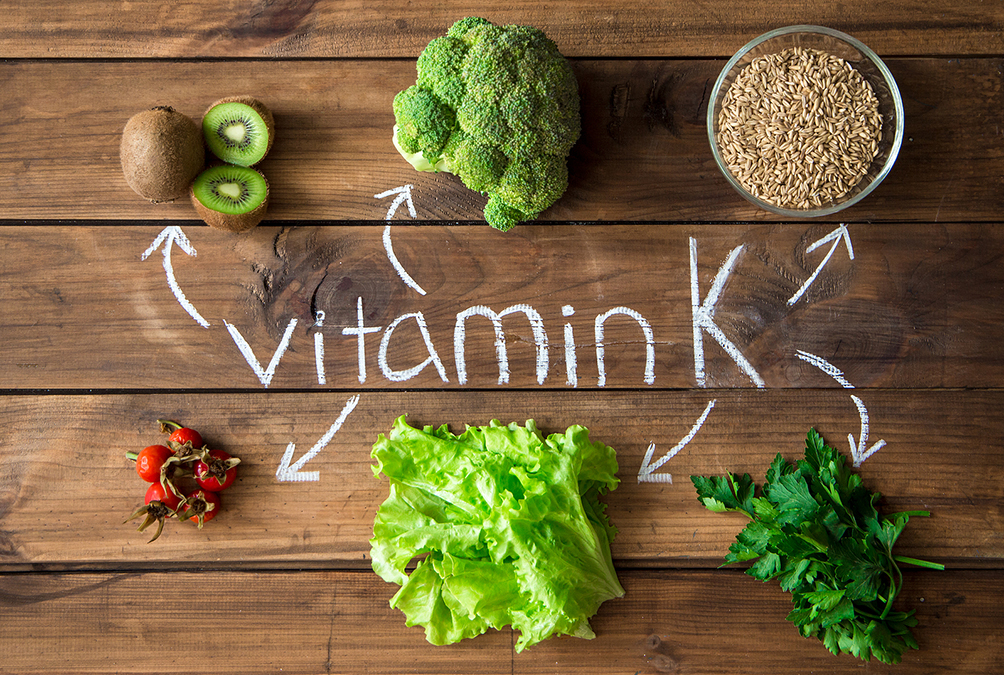 Throughout the years, vitamin D has gotten most of the attention for bone health.
Throughout the years, vitamin D has gotten most of the attention for bone health.
But a new study in Nutrients introduces another vitamin as even more important than vitamin D.
If you have been diagnosed or are concerned about osteoporosis, you must make sure you’re getting enough of this essential (but little talked about) vitamin.
The researchers carried out a review of the already published literature to shed light on the connection between vitamin K and bone health and to find out how exactly this vitamin works.
Their first finding was that vitamin K indeed acted as an osteoprotective agent, meaning it helps protect bones.
Osteocalcin, a protein produced by bone cells, plays a significant role in this process. When vitamin K is present, it helps osteocalcin bind to calcium more effectively, thereby aiding in maintaining proper bone mineralization and building.
This action is pivotal because it keeps bones strong and healthy.
The deficiency of vitamin K, on the other hand, leads to a rise in the levels of undercarboxylated osteocalcin. This form of osteocalcin is less effective in managing bone health and may thus lead to weaker bones.
This vitamin makes other contributions too. To have strong bones, our bodies break down old bone so that the new bone can be formed from fresh calcium and other minerals.
Vitamin K regulates the activity of osteoblasts (cells that form bone) and osteoclasts (cells that break down bone). This role ensures a healthy balance between bone formation and breakdown, crucial for maintaining strong bones.
The scientists also found that the recommended daily intake of 90 mcg/micrograms (females) and 120 mcg (males) of vitamin K set by health authorities might be lower than what is required for optimal bone health.
Higher doses of vitamin K2 are particularly beneficial in improving bone density and reducing fracture risks in various groups, including postmenopausal women and individuals with conditions like cerebral palsy and osteoporosis.
Vitamin K is relatively easy to include in your diet. Try some of the following:
-
1. Green leafy vegetables like kale, spinach, collard greens, Swiss chard, mustard greens, and turnip greens.
2. Other vegetables like Brussels sprouts, broccoli, asparagus, cabbage, and cauliflower.
3. Fermented foods are excellent sources of Vitamin K, particularly Vitamin K2, including natto, sauerkraut, and other fermented vegetables.

 Overcoming IBD
Overcoming IBD Multiple Sclerosis
Multiple Sclerosis Banishing Bronchitis
Banishing Bronchitis Gum Disease Gone
Gum Disease Gone Overcoming Onychomycosis
Overcoming Onychomycosis Neuropathy No More
Neuropathy No More The Prostate Protocol
The Prostate Protocol Brain Booster
Brain Booster
 Ironbound
Ironbound
 Solution for Shingles
Solution for Shingles
 The Bone Density Solution
The Bone Density Solution
 The Ultimate Healing Protocol
The Ultimate Healing Protocol
 The Parkinson's Protocol
The Parkinson's Protocol
 The Chronic Kidney Disease Solution
The Chronic Kidney Disease Solution
 Overthrowing Anxiety
Overthrowing Anxiety The Fatty Liver Solution
The Fatty Liver Solution The Hypothyroidism Solution
The Hypothyroidism Solution
 The End of Gout
The End of Gout The Blood Pressure Program
The Blood Pressure Program
 The Oxigized Cholesterol Strategy
The Oxigized Cholesterol Strategy
 Stop Snoring And Sleep Apnea Program
Stop Snoring And Sleep Apnea Program
 The Arthritis Strategy
The Arthritis Strategy The Vertigo & Dizziness Program
The Vertigo & Dizziness Program The 3-Step Diabetes Strategy
The 3-Step Diabetes Strategy Hemorrhoids Healing Protocol
Hemorrhoids Healing Protocol The Erectile Dysfunction Master
The Erectile Dysfunction Master Weight Loss Breeze
Weight Loss Breeze The IBS Program
The IBS Program The Insomnia Program
The Insomnia Program The Migraine and Headache Program
The Migraine and Headache Program The Neck Pain Solution
The Neck Pain Solution The Menopause Solution
The Menopause Solution The Ejaculation Master
The Ejaculation Master The TMJ Solution
The TMJ Solution The Acid Reflux Solution
The Acid Reflux Solution The Fibromyalgia Solution
The Fibromyalgia Solution The Psoriasis Strategy
The Psoriasis Strategy